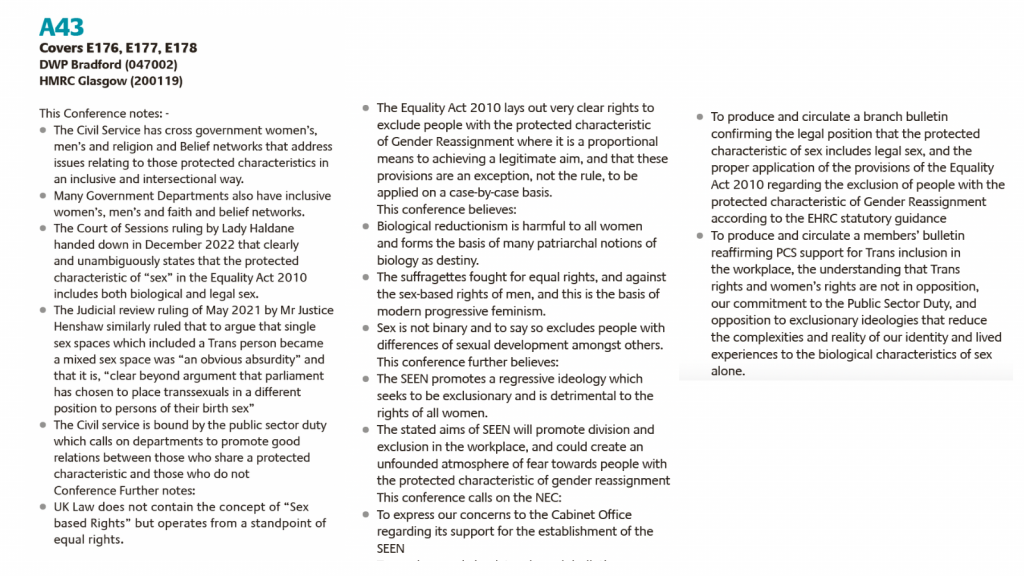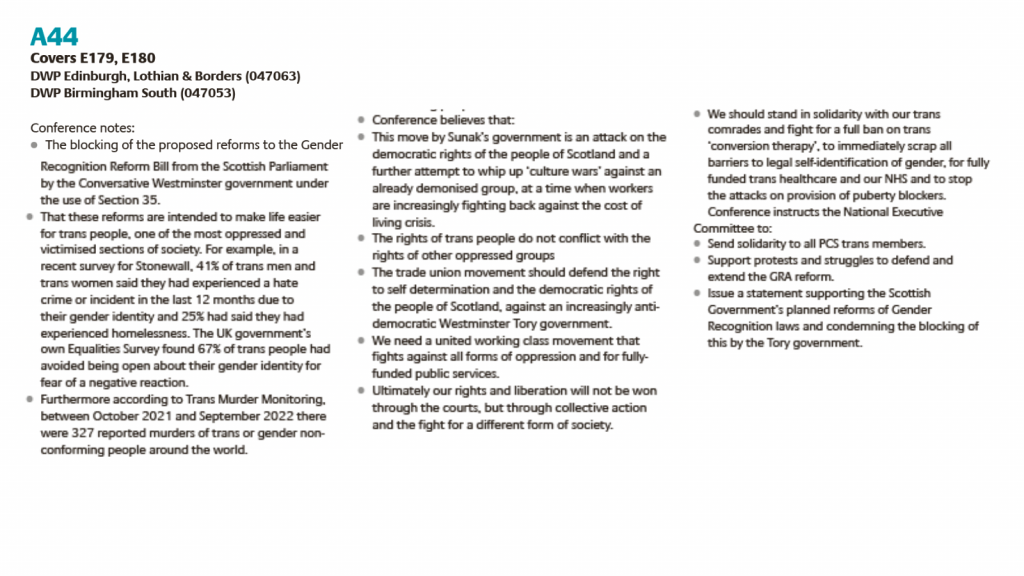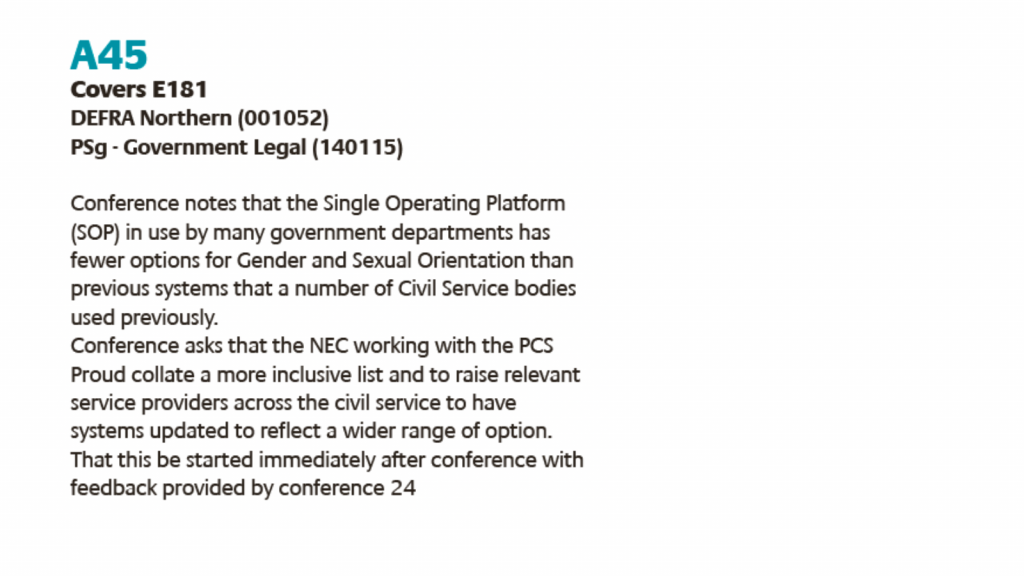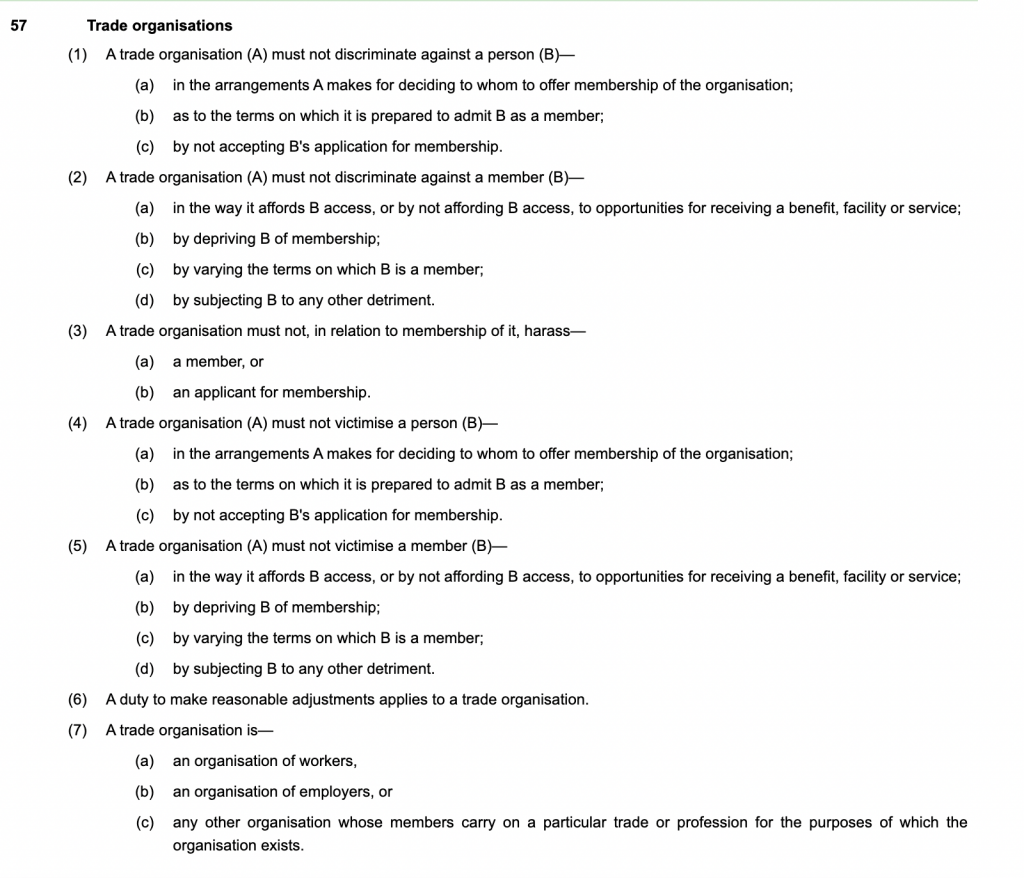Should a civil-service union promote harassment and discrimination?

At its annual conference starting on Tuesday 23rd May, PCS – Public and Commercial Services Union, the largest civil-service union – is planning to debate motions that denigrate gender-critical civil servants and the Equality and Human Rights Commission.
The motions seek to commit the union to a political stance about legalising gender self-ID, and to slip gender identities into government policy via a data system for civil-service HR data. Meanwhile, as the media have already reported, there is a motion calling for BDSM (Bondage, Discipline, Sadism and Masochism) training for civil servants.
After the Forstater judgment that gender-critical beliefs are worthy of respect in a democratic society, a group of gender-critical civil servants set up the Sex Equality and Equity staff network (SEEN). The network is concerned with sex discrimination and committed to the belief that biological sex is binary and immutable, but has stated that it “wishes to encourage a diversity of voices and open and respectful dialogue and tolerance between those with differing beliefs and experiences”.
The PCS’s motions smear the gender-critical civil servants in what is already a hostile environment for them. But unions are bound by the Equality Act 2010 and must not discriminate against their members based on protected characteristics, including belief. Civil servants are meant to abide by the Civil Service Code which includes complying with the law, not frustrating government decisions and not favouring or discriminating against particular individual or interests – certainly not lobbying against the independent statutory regulator on the Equality Act.
If these motions are passed there will be real questions about whether the union can defend its gender-critical members.
PCS members should attend conference and express views, and can complain to the union about deciding to accept the motions. We call on the PCS national executive to ask members to vote against the motions to show that it does not support bullying, harassment and discrimination against gender-critical staff.
Attacking the gender-critical civil servants’ group
Motion A43, proposed by union delegates from DWP Bradford and HMRC Glasgow, calls on the conference to agree that “sex is not binary” and that the SEEN gender-critical staff network “promotes a regressive ideology which seeks to be exclusionary and is detrimental to the rights of all women”. It says that “the stated aims of SEEN will promote division and exclusion in the workplace, and could create an unfounded atmosphere of fear towards people with the protected characteristic of gender reassignment”.
The motion seeks to instruct the National Executive Committee to express concern to the Cabinet Office that the network was allowed to be set up, and for it to produce and circulate a branch bulletin “confirming the legal position that the protected characteristic of sex includes legal sex” and the “understanding that Trans rights and women’s rights are not in opposition” and that “opposition to exclusionary ideologies that reduce the complexities and reality of our identity and lived experiences to the biological characteristics of sex”.

Stepping into constitutional debates
Motion A44, proposed by delegates from DWP Edinburgh, Lothian & Borders and DWP Birmingham South, wades into the political debate about the Scottish GRR Bill and calls on the civil-service union to condemn the UK government’s use of Section 35 of the Scotland Act as “an attack on the democratic rights of the people of Scotland”.

Self-ID by the back door
Motion A45 from DEFRA Northern and Government Legal sounds less political but notes that the “Single Operating Platform” (the internal government information system) has fewer options for “gender” than previous systems and ask to for the PCS to collate “a more inclusive list”. This suggests they are seeking to reintroduce options beyond male and female to the sex field (which is often labelled “gender”).

Attacking the EHRC
Motion A46 from DWP Sheffield and Bradford criticises Baroness Kishwer Falkner, Chair of the Equality and Human Rights Commission, saying that she “has expressed views that support attacks on the rights of trans people to be recognised in their acquired gender”. It calls on conference to instruct the NEC to lobby the government towards their view of “trans rights” and to support the TUC alliance for trans and non-binary rights, which seeks to “unequivocally commit the UK trade union movement to the cause of trans liberation”. It also seeks for conference to instruct it to produce a branch bulletin on the “misuse of concepts such as ‘freedom of speech’ and ‘academic freedom’ examined through a LGBT+ liberation lens”.

What the Equality Act says
Trades unions are covered by the Equality Act and must not discriminate against, harass or victimise members based on their protected characteristics. This includes the protected characteristic of belief; it does not include BDSM.

